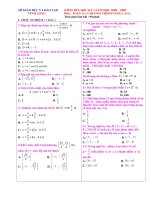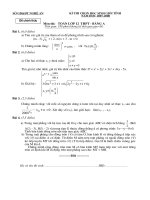Astm a 636 08 (2013)
Bạn đang xem bản rút gọn của tài liệu. Xem và tải ngay bản đầy đủ của tài liệu tại đây (58.83 KB, 2 trang )
Designation: A636 − 08 (Reapproved 2013)
Standard Specification for
Nickel Oxide Sinter1
This standard is issued under the fixed designation A636; the number immediately following the designation indicates the year of
original adoption or, in the case of revision, the year of last revision. A number in parentheses indicates the year of last reapproval. A
superscript epsilon (´) indicates an editorial change since the last revision or reapproval.
1. Scope
5. Sampling for Chemical Analysis
1.1 This specification covers one grade of nickel oxide
sinter, designated as 75 used for alloying in iron and steel
melting.
5.1 The material shall be sampled in accordance with
procedures outlined below:
5.1.1 The sample shall be taken by cutting across the entire
stream at regular intervals during the time of movement of the
mass being sampled. The quantity to be taken at each interval
and the number of such intervals shall be so proportioned that
the total quantity taken shall amount to not less than 0.40 % of
the total material being sampled.
2. Referenced Documents
2.1 ASTM Standards:2
A1025 Specification for Ferroalloys and Other Alloying
Materials, General Requirements
5.2 Treatment of Sample:
5.2.1 In the case of nickel oxide sinter 75, the sample
representing each shipment or lot shall be reduced in amount
using a riffle splitter or other suitable mechanical splitter to
1000 g. This 1000-g sample shall be placed in an oven at 250°F
(121°C) for 1⁄2 h to remove any traces of moisture, and then
pulverized to pass an 80-mesh screen using appropriate equipment to avoid sample contamination. Approximately 250 g of
this pulverized material shall be split out for copper and sulfur
assays, using a riffle splitter or other suitable mechanical
splitter. The unused portion of individual shipment (or lot)
samples whose copper and sulphur assays are within specification shall be combined by weight into two, three, or four lot
composites. Approximately 250 g of the composited material
shall be split out, using a riffle splitter or other suitable
mechanical splitter and analyzed for nickel. This nickel analysis shall apply to each shipment (or lot) comprising the
composite.
3. General Conditions for Delivery
3.1 Materials furnished to this specification shall conform to
the requirements of Specification A1025, including any supplementary requirements that are indicated in the purchase order.
Failure to comply with the general requirements of Specification A1025 constitutes nonconformance with this specification.
In case of conflict between the requirements of this specification and Specification A1025, this specification shall prevail.
4. Chemical Requirements
4.1 The chemical requirements are shown in Table 1.
1
This specification is under the jurisdiction of ASTM Committee A01 on Steel,
Stainless Steel and Related Alloys and is the direct responsibility of Subcommittee
A01.18 on Castings.
Current edition approved April 1, 2013. Published April 2013. Originally
approved in 1970. Last previous edition approved in 2008 as A636 - 08. DOI:
10.1520/A0636-08R13.
2
For referenced ASTM standards, visit the ASTM website, www.astm.org, or
contact ASTM Customer Service at For Annual Book of ASTM
Standards volume information, refer to the standard’s Document Summary page on
the ASTM website.
6. Keywords
6.1 nickel; nickel oxide; sinter
Copyright © ASTM International, 100 Barr Harbor Drive, PO Box C700, West Conshohocken, PA 19428-2959. United States
1
A636 − 08 (2013)
TABLE 1 Chemical Requirements
Composition, %
Element
Grade 75
Nickel, min
Cobalt, max
Copper, max
Iron, max
Sulfur, max
75.00
1.30
0.90
0.50
0.02
ASTM International takes no position respecting the validity of any patent rights asserted in connection with any item mentioned
in this standard. Users of this standard are expressly advised that determination of the validity of any such patent rights, and the risk
of infringement of such rights, are entirely their own responsibility.
This standard is subject to revision at any time by the responsible technical committee and must be reviewed every five years and
if not revised, either reapproved or withdrawn. Your comments are invited either for revision of this standard or for additional standards
and should be addressed to ASTM International Headquarters. Your comments will receive careful consideration at a meeting of the
responsible technical committee, which you may attend. If you feel that your comments have not received a fair hearing you should
make your views known to the ASTM Committee on Standards, at the address shown below.
This standard is copyrighted by ASTM International, 100 Barr Harbor Drive, PO Box C700, West Conshohocken, PA 19428-2959,
United States. Individual reprints (single or multiple copies) of this standard may be obtained by contacting ASTM at the above
address or at 610-832-9585 (phone), 610-832-9555 (fax), or (e-mail); or through the ASTM website
(www.astm.org). Permission rights to photocopy the standard may also be secured from the ASTM website (www.astm.org/
COPYRIGHT/).
2









